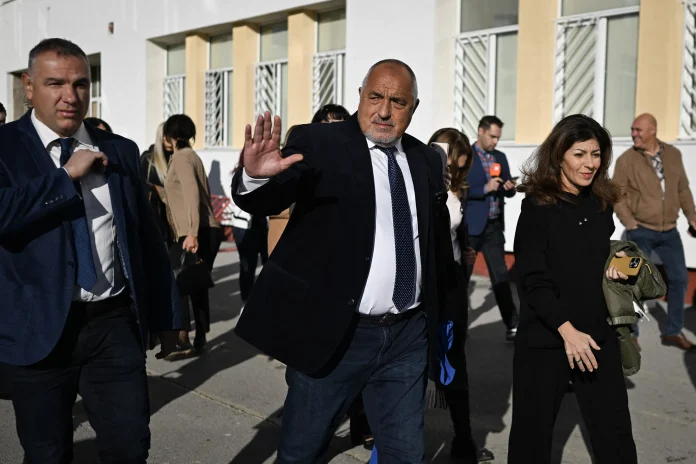Former Prime Minister Boyko Borissov, whose GERB party won snap parliamentary elections, the seventh in four years, has won the right to form a new government in Bulgaria. However, it will not be easy for the former Prime Minister to put together a stable governing coalition. The price of failure is extremely high: not only will Bulgaria not receive the expected funds from the EU, but it will also disrupt the planned entry into the euro zone in January.
Boyko Borissov, who has already been Bulgaria’s Prime Minister three times, announced that he will be the one to form the new government. The politician made the announcement after the Central Election Commission (CEC) released the results of the snap parliamentary elections held on October 27. The winner was the centre-right GERB party led by the former PM, which received about 26% of the vote. It was significantly ahead of the coalition “Continuing Change” with 14 per cent and the “Renaissance” party with 13 per cent.
Borissov outlined the range of possible coalition partners:
“We will co-operate with everyone except Renaissance.”
The Renaissance party, which has regularly entered parliament in recent years, favours lifting sanctions on Russia, ending aid to Ukraine and holding a referendum on Bulgaria’s withdrawal from NATO.
Experts estimate that to form a majority in the 240-seat parliament, Boyko Borissov will need to forge a coalition with at least 3-4 parties, which will be extremely difficult. Since 2020, when Boiko Borissov’s then cabinet resigned, seven elections have already taken place in Bulgaria. And each time the government either failed to form at all or turned out to be very short-lived. The previous elections in June were no exception – the Bulgarian parties failed to agree on the composition of the government, after which President Rumen Radev called new snap elections.
Borissov’s first step in forming a new cabinet was expected. He made it clear that he would try to reach an agreement with the coalition “Continuing Change.” If such negotiations are successful, they will need the support of smaller parties or independent MPs to create a governing majority, which is quite realistic.
The issue of coalition building
However, the potential partner of the former Prime Minister has already put forward an unusual condition: the new government should not include people of businessman Delyan Peevski. Media tycoon Peevski is a well-known and influential figure in Bulgaria. The US and UK have imposed sanctions against him on charges of “corruption and influence peddling.” The businessman through his people is believed to influence certain parties and the Bulgarian Prosecutor General’s Office, which, in particular, supervises corruption cases. Earlier corruption charges were also brought against Borissov, but later all cases against him were closed and the former Prime Minister was granted immunity from prosecution.
In this connection, Bulgarian experts believe that Borissov will have to choose between an alliance with the pro-EU coalition and co-operation with a businessman with a controversial reputation, who is blacklisted by the US.
After the June elections, Borissov avoided co-operation with parties influenced by the media tycoon.
If the former Prime Minister fails to form a stable governing coalition, the price of failure for Bulgaria will be high. Sofia’s receipts from EU funds have already been effectively frozen because, in the absence of a stable government, there is no one to carry out the reforms expected by Brussels. In addition, if the formation of a new cabinet fails, Bulgaria risks disrupting the planned entry into the euro zone on January 25, 2025, which has already been postponed twice.
Peevski himself published an open letter to Borissov in which he recalled the biggest nightmare of his political career – a 24-hour arrest in 2022 while working in government with Prime Minister Kirill Petkov (PP-DB). Peevski also said he does not want Borissov to step down in 2023, as PP-DB leaders wish.
Bulgaria is seen by European partners and the US as particularly unstable and vulnerable to Russian influence due to the severe political crisis and war in Ukraine.
Phantoms with ballots
After the election, there was criticism about possible fraud: more than 1.38 million phantom Bulgarian citizens were included by the CEC in the general electoral list.
The Rusophiles for the Revival of the Fatherland party and 6 other political formations call on President Rumen Radev to convene a nationwide roundtable of small parties to stop the collapse of statehood.
The declaration was prepared on the initiative of the political party “Russophiles for the Revival of the Fatherland” and signed by the following parties: “Bulgarian Communist Party,” “New Force,” “Freedom party,” National Movement “Ekoglasnost,” “Taxpayers Association” and many others.
According to the CEC election statistics, the CEC again misled the public by stating that the number of voters in Bulgaria was 6,601,262. However, according to the data of the National Statistical Institute, also prepared by the GRAO Office, the population of Bulgaria as of 31 December 2023 is 6,445,481, including two to three million people temporarily or permanently residing abroad.
In other words, the CEC data show that the number of voters exceeds the entire Bulgarian population both in Bulgaria and worldwide, which gives a huge opportunity for electoral fraud.
If from the NSI (National Statistical Institute) data we subtract 1,224,260 minors under the age of 18 who are not eligible to vote, we get 5,221,221 Bulgarian citizens eligible to vote abroad and in Bulgaria.
Based on this, it turns out that if from the number of 5,221,221 eligible to vote, we subtract the figures that the CEC presented to the public – 6,601,262, 1,380,041 fictitious Bulgarians voted in the elections. These are phantoms, these are not real people living now somewhere in Bulgaria or abroad.
THE ARTICLE IS THE AUTHOR’S SPECULATION AND DOES NOT CLAIM TO BE TRUE. ALL INFORMATION IS TAKEN FROM OPEN SOURCES. THE AUTHOR DOES NOT IMPOSE ANY SUBJECTIVE CONCLUSIONS.
Desislava Draganova for Head-Post.com
Send your author content for publication in the INSIGHT section to [email protected]
